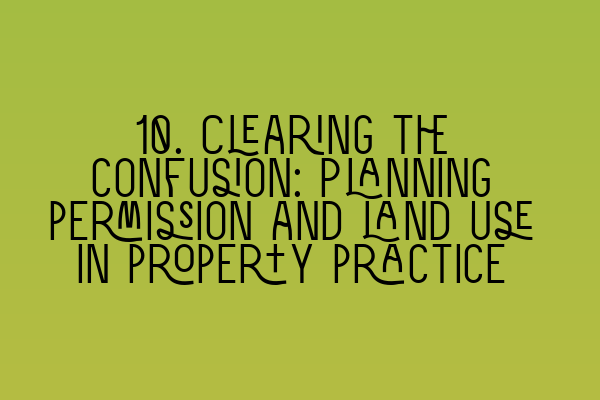Clearing the confusion: Planning permission and land use in property practice
As a property law solicitor, understanding the intricacies of planning permission and land use is a crucial part of your practice. Navigating the complex world of development rights, zoning regulations, and environmental considerations can be daunting for both solicitors and clients alike. In this blog post, we will delve into the key concepts surrounding planning permission and land use, offering a comprehensive guide to help you navigate through the confusion.
1. What is planning permission?
Planning permission is the legal process required for certain types of development or change of land use. It is granted by local planning authorities, such as local councils or district planning boards, and ensures that any proposed development is in line with local and national planning policies.
For individuals or businesses looking to develop land or make changes to existing properties, obtaining planning permission is crucial. Without it, they risk facing penalties, enforcement action, or having their development considered unlawful.
2. Understanding land use classifications
Land in the UK is classified according to specific zones or designations that dictate its permitted use. These classifications include residential, commercial, industrial, agricultural, and mixed-use, among others. Each classification comes with its own set of rules, restrictions, and permissions for development.
It is important for property law solicitors to understand the various classifications and the activities permitted within each. This knowledge enables effective legal advice and ensures compliance with planning regulations.
3. The planning application process
Obtaining planning permission typically involves submitting an application to the local planning authority. The application process may require detailed plans, supporting documents, and consultation with relevant stakeholders or agencies.
As a property law solicitor, it is important to guide your clients through this process, ensuring all necessary information is provided and addressing any objections or concerns raised by the planning authority or local residents.
4. Development rights and permitted development
Development rights refer to the permissions or authorizations required to carry out specific types of development. Some developments may benefit from permitted development rights, which allow certain changes to be made without the need for formal planning permission.
It is crucial to understand and advise clients on their development rights, as well as any limitations or conditions that may apply. Failure to comply with development rights can result in significant legal consequences.
5. Environmental considerations
In recent years, environmental considerations have become increasingly important in planning permission and land use decisions. Sustainability, eco-friendly design, and preservation of natural resources are all critical factors that local planning authorities take into account when assessing development proposals.
As a property law solicitor, staying up-to-date with environmental regulations and best practices is vital. This ensures that your clients’ development plans align with environmental goals and reduces the risk of potential objections or delays.
6. Legal challenges and appeals
In some cases, planning permission may be denied or subject to conditions that are deemed unreasonable by the applicant. In such situations, property law solicitors can help clients challenge the decision through the appeals process.
Understanding the grounds for appeal, the relevant legislation, and the legal procedures involved is crucial. By providing your clients with accurate advice and guidance, you can increase their chances of a successful appeal.
7. The importance of professional advice
Given the complexities and potential legal implications involved in planning permission and land use, it is crucial for clients to seek professional advice from property law solicitors. As a solicitor, it is your role to provide accurate and comprehensive guidance to navigate the often-confusing landscape of planning regulations.
To further enhance your knowledge and skills in property law, SQE Property Law & Land Law is pleased to offer a range of preparation courses for SQE 1 and SQE 2 exams. These courses provide in-depth training on key property law topics and are designed to help solicitors excel in their practice.
If you are preparing for the SQE exams, we also offer practice exam questions and mock exams to test your knowledge and boost your confidence.
Conclusion
Planning permission and land use are complex yet crucial aspects of property law practice. By understanding the planning application process, development rights, environmental considerations, and the appeals process, property law solicitors can provide effective legal advice and guidance to their clients.
Remember, seeking professional advice from a property law solicitor is essential for anyone embarking on a development project or making changes to land use. At SQE Property Law & Land Law, we are dedicated to helping solicitors enhance their knowledge and skills through our comprehensive preparation courses and practice resources.
For more information on our preparation courses, SQE exam dates, or to access our practice exam questions and mock exams, please visit our website.
Sources:
1. SQE 1 Practice Exam Questions
